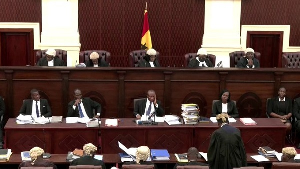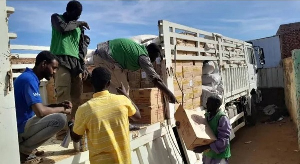The government of President Nana Addo Dankwa Akufo-Addo has set itself the task of re-engineering technical and vocational education in Ghana to be abreast of modern trends, Vice-President Dr Mahamudu Bawumia has stated.
To realise this objective, President Akufo-Addo cut the sod for the commencement of work on the upgrade and modernisation of the Technical and Vocational Education and Training (TVET) system in Ghana two weeks ago, to add to earlier interventions aimed at positioning TVET at the centre of development policy.
Speaking at the 39th edition of the Kristo Asafo Mission of Ghana annual Technology and Agricultural Exhibition in Accra on Sunday, 29 December 2019, Dr Bawumia said there is a multi-pronged approach to the push for greater attention for TVET.
“The resolve by the government of President Akufo-Addo is to make technical and vocational education a major component of our educational curriculum.
“The first component of the President’s TVET project comprises upgrading of some 35 National and Vocational Training Institutes as well as Colleges of Education that specialise in technology; refurbishing the existing infrastructure and construction of new head office, 10 regional offices and five apprenticeship offices; and procurement of equipment for 26 trades and ICT equipment for all 34 NVTI centres.
“It also includes competency-based training to cover 700 trainers across 34 NVTIs; a major revision of the curricula of TVET schools to make them relevant to the needs of Ghana’s changing economy; and transport facilities, including the provision of a 33-seater bus for each of the 34 NVTIs and 4×4 Pickups for the head office and regional offices.”
Furthermore, to make technical and vocational more accessible, the government, in 2018, announced the inclusion of TVET in the free SHS programme, the Vice-President indicated, and wondered why some people are touting this as their new bright idea.
Dr Bawumia continued: “The second component shall comprise the setting up of two new training centres for foundry and machining workshops, with one at the Council for Scientific and Industrial Research (CSIR) centre in Accra, and the other at Kwame Nkrumah University of Science and Technology. All these, are, in part, an intricate part of the key ingredient to Ghana’s transformation toward becoming an industrialised nation in the shortest possible time.”
As well, the government is constructing 20 state-of-the-art TVET institutions in all regions. There is also a $130-million project for the construction of training workshops for five polytechnics and technical universities together with 10 technical institutes in areas such as mechanical engineering, automobile engineering, civil engineering, welding engineering and others.
All technical universities and polytechnics have also been provided with state-of-the-art laboratories and workshops with equipment. These are equipment that meet industry 4.0 standards.
Dr Bawumia lauded the remarkable achievements chalked by Apostle Prof. Ing. Kwadwo Safo, the founder and leader of the Kristo Asafo Mission, especially in the area of agricultural and technological development, saying: the “government alone cannot lead the way by bringing a new dimension to our educational structure and industrial transformation. It behoves some individuals and corporations to contribute to the wellbeing of society by identifying the problems and offering solutions.
“This, I believe, is what Apostle Prof. Ing. Kwadwo Safo and the Kristo Asafo have identified by offering practical-oriented teaching and learning, as well as spearheading technology and scientific researches that will put Ghana and Africa on the path to development. I have been here over the years, and I am always highly impressed by what he has done so far and the government will continue to support Kantanka.
Click to view details



Business News of Tuesday, 31 December 2019
Source: laudbusiness.com

















